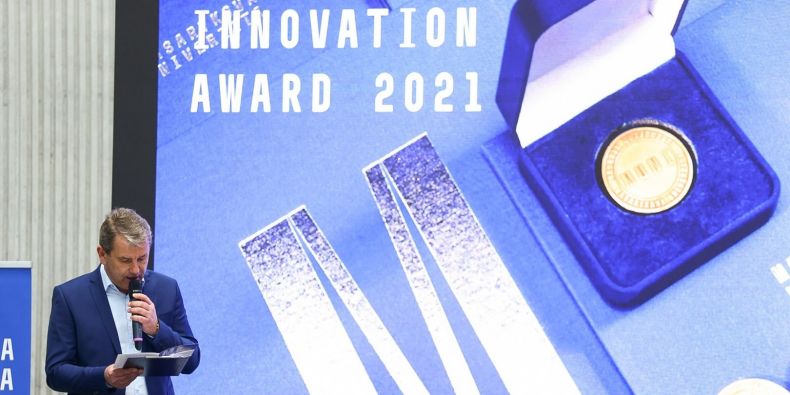Business Research Forum, the marketplace for opportunities for cooperation between the university and the application sector, took place for the fourth time in the university’s Bohunice campus. Every two years the event welcomes scientists and researchers from the university, partners, companies and professionals.
For the first time, this year’s event included the MUNI Innovation Awards – the university’s new awards for exceptional innovative achievements. The achievements recognised were successfully implemented, or they helped improve various products or services, or otherwise increased the social relevance of the research activities taking place at Masaryk University.
As Vice-Rector for External Relations and Lifelong Education Martin Kvizda says, organisers found inspiration abroad. “We saw these awards at some universities abroad, but we did not want to recognise only purely technological achievements, patents or licenses. We really wanted to acknowledge innovative spirit, social impacts and benefits for the company in question but also for the society as a whole,” says Kvizda who was the guarantor of the awards.
The 1st MUNI Innovation Award saw fifty nominations. The evaluation committee (mostly vice-deans for science and research, among others) chose 17 projects or achievements to receive the award. “Factors included motivation for the award, or the fact whether the achievements are finished or underway, so speak, or the visibility of Masaryk University and social impacts of the project,” says Eva Janouškovcová, director of the Technology Transfer Office, adding that the representation of individual fields played a key role as well. Almost one-half of the nominations were from the Faculty of Science.
“Since this is the first time, it was not easy to define the conditions and rules of this award,” Janouškovcová admits. “I think that ultimately we succeeded, but the selection was not easy at all. Behind every nomination, be it an individual or team, there are often large teams of colleagues, years of work and tremendous effort. The professional diversity of the members of the evaluation committee certainly helped.” The committee could seek advice from members of the Council for technology transfer and commercial cooperation and the team of the Technology Transfer Office; the results were ultimately approved by the top management of Masaryk University.
We are hoping to have founded a new tradition in spite of the strict measures that affected the whole Business Research Forum and the award ceremony. This year’s MUNI Innovation Award recognised projects from the last six years, but starting with the next award project from the preceding two-year period will be recognised.
Winners of MUNI Innovation Award 2021:

Kamil Paruch, Vítězslav Bryja, Pavlína Janovská (Faculty of Science) – Award for unique research into the inhibition of casein kinase 1, which included the synthesis of new highly selective and patentable compounds. The work resulted in the foundation of a spin-off company under the name CasInvent Pharma whose main ambition is to bring the compound to clinical testing phase.

Ondřej Slabý (CEITEC) – Award for the invention of innovative diagnostic methods in various medical fields, especially oncology. The patented method of diagnosis of colorectal carcinoma developed in cooperation with the Masaryk Memorial Cancer Institute has been licensed by BioVendor and will soon become available for practical oncologic treatment.
Aleš Horák (Faculty of Informatics) – Award for the system for the creation and publishing of the electronic and printed version of Nový encyklopedický slovník češtiny, which has brought a major change in the method of creation of dictionaries in modern lexicography. The online version of the specialised linguistic dictionary saw more than 4 million page views and more than 2 million visitors over four years.

Tomáš Řezník (Faculty of Science) – Award for the creation of a unique data model known as the Global Soil Information System (GloSIS) for information on soils which allows for data sharing and modelling across countries and continents. The innovation consists not only in new methods of modelling of soil information but also in the complexity of the resulting data model.

Petr Švenda (Faculty of Informatics) – Award for the design of new methodologies for the analysis of security systems and cryptographic implementations. They enable the verification of security in newly developed equipment and the detection of errors in existing ones (or to allow for timely repair to avoid misuse). In 2017 Švenda and his team found and helped eliminate the most serious cryptographic vulnerability in present-day electronic ID cards of many European countries, and in security chips used by leading companies (Google, Microsoft). The outcomes of the research allowed for changes in global certification procedures in the area of generating keys for digital signature.
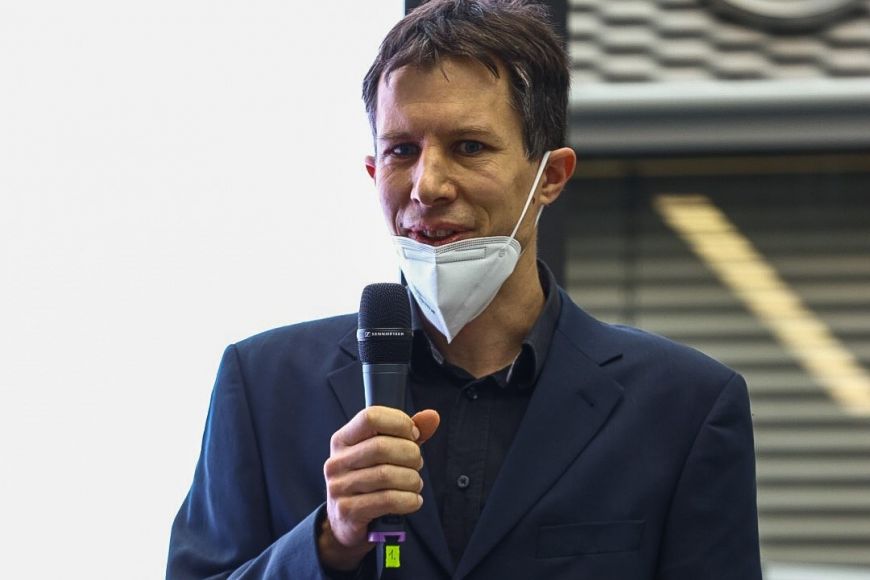
Radek Pelánek (Faculty of Informatics) – Award for the outcomes of research using machine learning methods and data processing that served as source data in the design of teaching systems implemented at the website www.umimeto.org. The website is used by approximately 10% of Czech schools.

Jiří Zeman (Faculty of Pharmacy) – Award for the development of a system for the detection of certain toxic substances that can be used for life-saving procedures and measures as well as for the detection of the presence of pollutants of various kinds, even at the global scale. The system was developed in cooperation with the Oritest company and allows for faster, more precise and easily reproducible detection of, in particular, chemical weapons in contaminated environments.
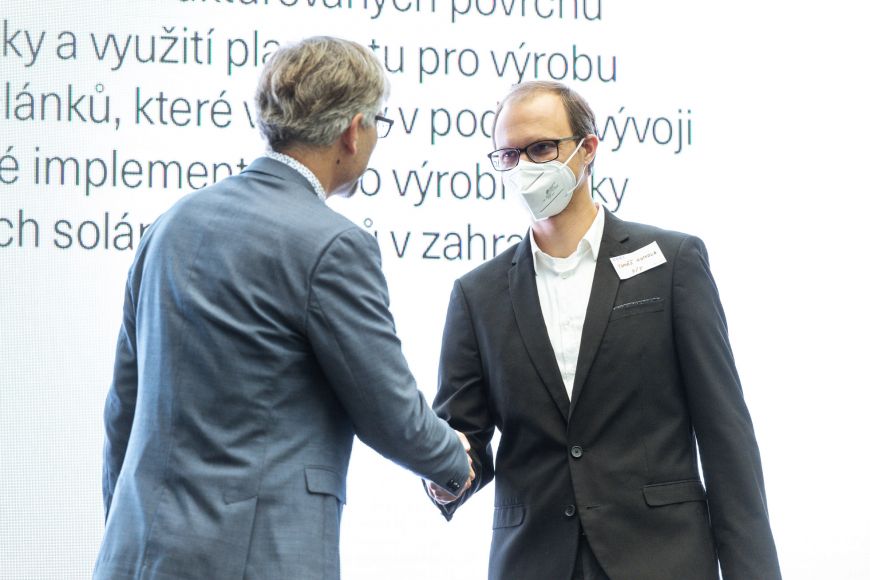
Tomáš Homola (Faculty of Science) – Award for the applications of plasma finishes of nanostructured surfaces in the area of flexible and printed electronics and the use of plasma in the production of large printed solar cells which resulted in the participation in the development of plasma technology and its successful implementation in a production line for the production of flexible perovskite solar cells at Saule Technologies.

Alena Žákovská (Faculty of Science/Faculty of Education) – Award for long-term research into Lyme disease and its impact on the society, as well as the related media coverage and edification towards the general public and professionals, including direct cooperation with patients, especially in the case of chronic and hard-to-treat forms.
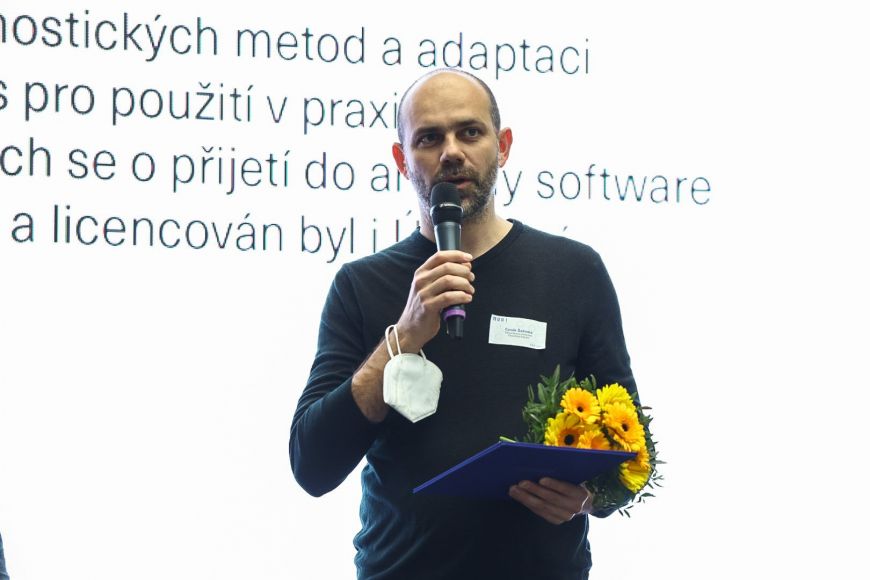
Čeněk Šašinka (Faculty of Arts) – Award for the development of online psychodiagnostic method and the adaptation of the related Hypothesis software for practical use. The software is used for the diagnosis of recruits by the Military Hospital Brno, and it was also licensed by the Military University Hospital Prague.
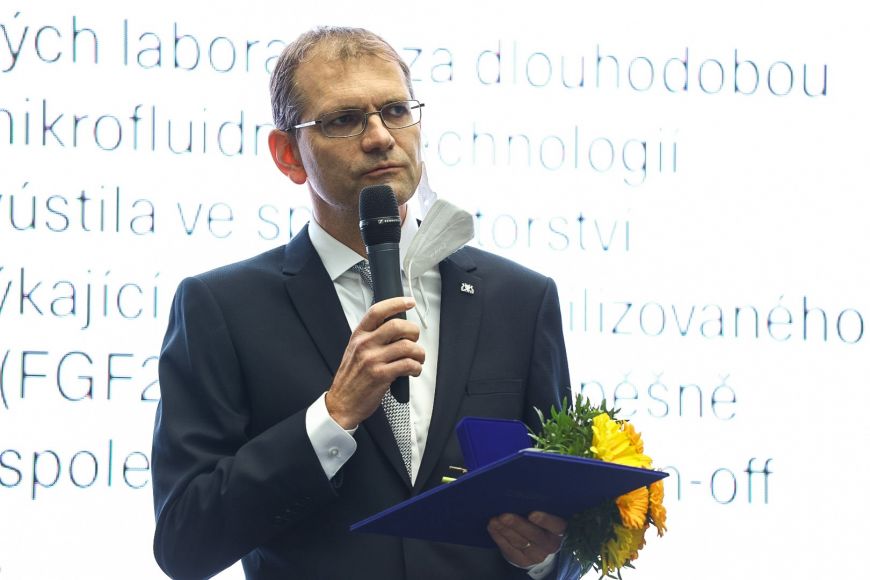
Jiří Damborský and Zbyněk Prokop (Faculty of Science) – Award for the long-term development of computer programmes and microfluidic technologies for protein engineering which resulted in co-authorship of international patent application regarding the production of fibroblast growth factor (FGF2). The method is successfully commercialised through the Enantis company, a spin-off company of MU.
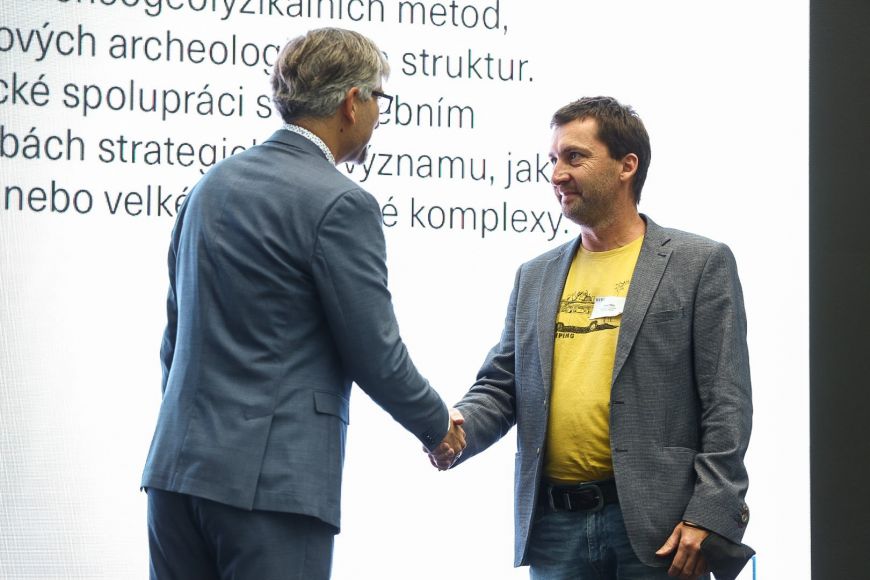
Peter Milo (Faculty of Arts) – Award for innovative achievements in the area of archaeogeophysical methods used for the detection of subterranean features. These methods are used in practical cooperation with the construction and development industry at construction sites for strategic buildings, such as motorways, utilities or large industrial parks.

Karel Lacina (CEITEC) – Award for the development of several types of biosensors and analytical apparatuses for the detection of the presence of certain substances in liquid samples. Three of his inventions are patented. He cooperates with various commercial partners, including GeneProof, Seant, Velza or Umana Medical.
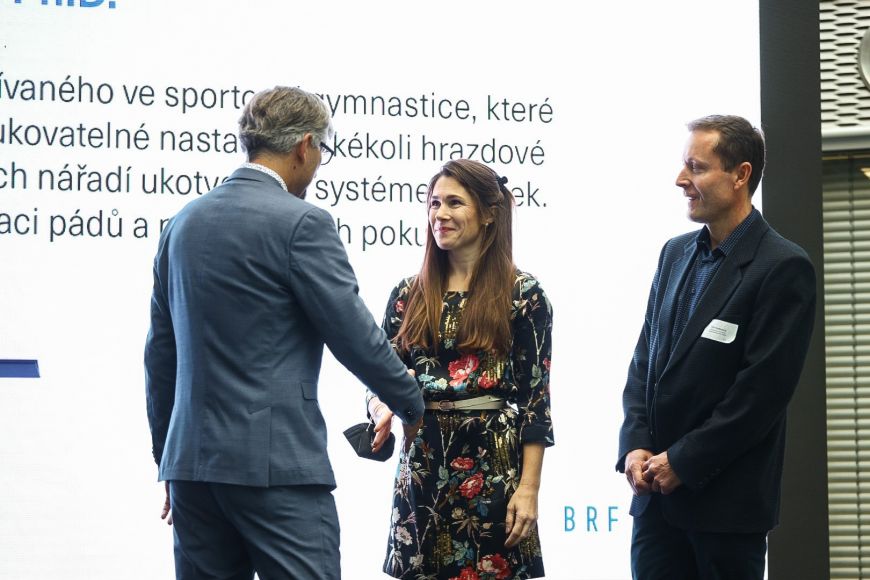
Miriam Kalichová, Petr Hedbávný (Faculty of Sports Studies) – Award for the development of equipment used in artistic gymnastics that allows for the precise and reproducible setting of any bars including apparatuses attached using pulling systems from various manufacturers, as is typical for competitions. The equipment minimises unsuccessful attempts and falls.
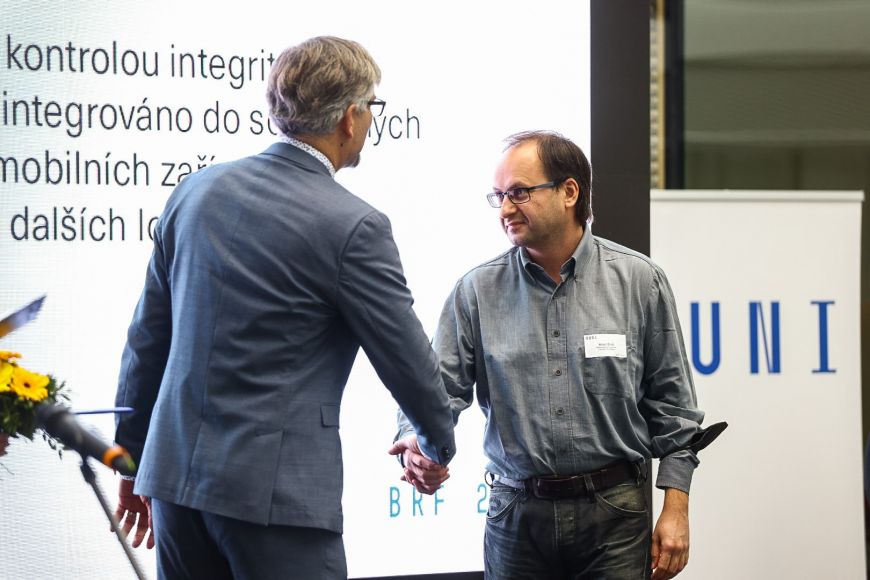
Milan Brož, Mikuláš Patočka, Václav Matyáš (Faculty of Informatics) – Award for the creation of a solution for disc encryption with data integrity control in the Linux OS which is fully integrated in the current versions of this OS including mobile devices with Android OS and many other IoT devices.
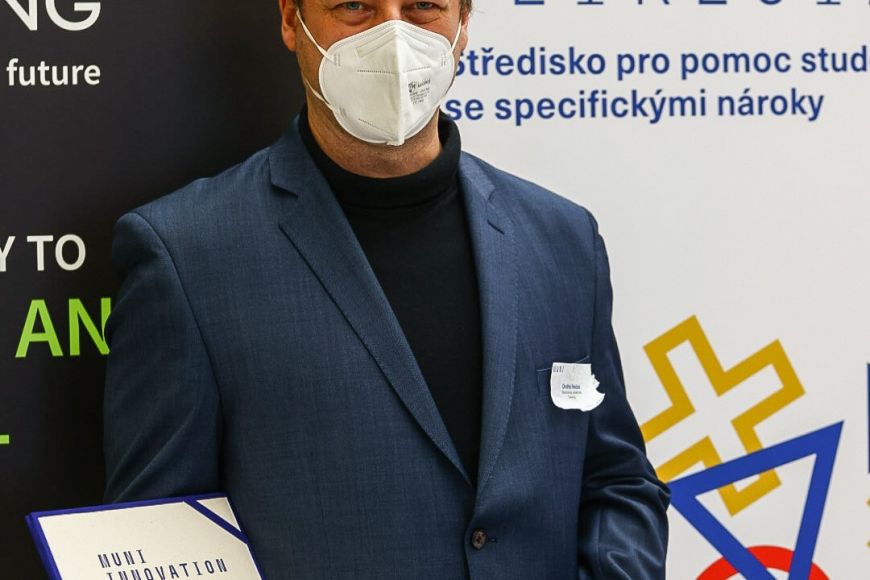
Ondřej Nečas, Petr Červenka (Teiresiás) – Award for the development of the BUF software which is now used all over the country for the conversion, layout and printing of texts in Braille, and a system for the automatic generation of data for the production of tactile maps for the blind that are implemented all over the world.
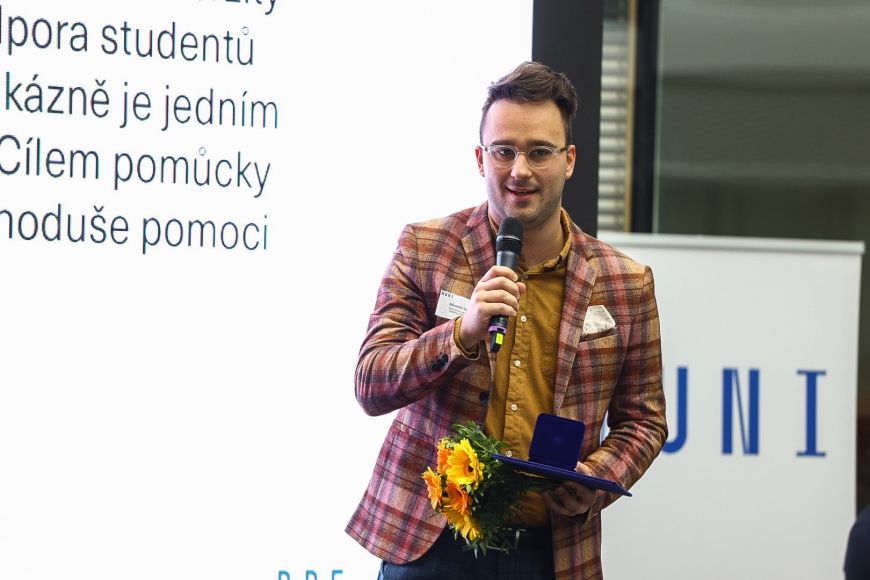
Miroslav Jurčík (Faculty of Education) – Award for the BEZRÁKOSKY teaching cards created as a teaching aid for students of the eponymous field of study at the Faculty of Education. Today they are actively used by teachers. The insufficient support of students and young teachers in the area of ensuring discipline is among the key problems teachers have to face. The purpose of this aid is to provide a specific tool that can be effective in handling conflicting situations.
